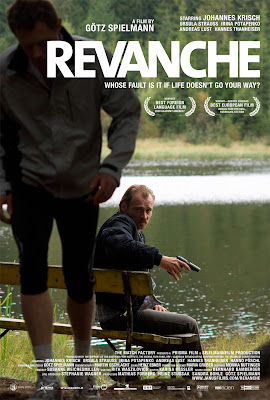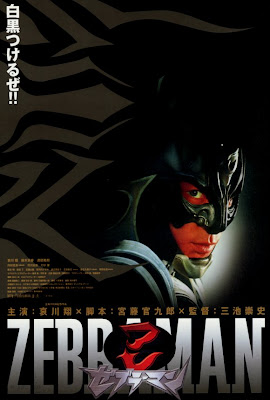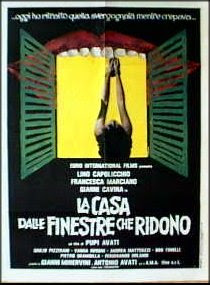Revanche (2008) Despite the title (the French word for “revenge”), writer/director Gotz Spielmann’s drama is more about quietly reflective moments than brash retaliatory acts. In the opening shot we see ripples in a pond, serving as a metaphor for the events that will shortly follow – one thing cannot occur without creating a series of interrelated occurrences. Tamara (Irina Potapenko) is an illegal Ukranian immigrant working in a brothel in Austria. Alex (Johannes Krisch) is her ex-con boyfriend, who does odd jobs around the brothel. Both dream of a better life, but they appear to be trapped in their current circumstances. He decides to pull off one more heist by robbing a local bank, assuring her that nothing can go wrong, but it’s clear that this is a terrible idea from the start. At this point, the story takes an unexpected turn, leading to a cruel twist of fate, in which the lives of Alex and Robert (Andreas Lust), a local policeman, will become inextricably intertwined. All of the lead performances ring true, with acting that’s natural and unforced. The plot does not follow a predictable arc, but unfolds at a deliberate pace, tracing Alex and Robert’s feelings of intense guilt. Spielmann takes the time to weave in a subplot about Alex’s renewed relationship with his estranged grandfather, without derailing the central story. It’s a sad, but captivating character study of damaged individuals wallowing in pain that they cannot mitigate.
Rating: **** ½. Available on DVD and Blu-ray.
Summer Wars (2009) This imaginative and charming anime film from director Mamoru Hosoda centers around Kenji, a socially awkward high school kid with a gift for solving complex math problems. He’s more comfortable with computers than people, employed as a low-level monitor for Oz – a ubiquitous virtual environment for work and play, but he soon discovers that his online and physical lives are about to merge. Meanwhile, in the real world, he agrees to accompany his classmate Natsuki on a trip to the country for a family reunion, to celebrate her great grandmother’s 90th birthday. He gets more than he’s bargained for, however, when he realizes that she wants him to pose as her fiancé. In the virtual world, things go from bad to worse when a malicious AI program infiltrates Oz. The sentient program steals millions of accounts around the world, bringing global commerce to a standstill, and cutting off vital support functions in many governments – and he’s the prime suspect. The trailer and Netflix description are somewhat misleading. Although the virtual environment element is certainly prevalent, it’s as much a coming-of-age/family drama as it is a near-future cyberspace film. Kenji and Natsuki grapple with everyday themes of life, death, love and responsibility – while the fate of the world hangs in the balance.
Rating: ****. Available on DVD and Blu-ray
Zebraman (2004) From prolific and versatile director Takashi Miike comes a new kind of superhero story. Third-grade teacher Shinichi’s (Shô Aikawa) life sucks. None of his students or school administrators respect him, and his home life isn’t any better. His wife is cheating on him, his teenage daughter is dating a sociopathic older man, and his son is constantly tormented by fellow classmates because of Shinichi’s less than stellar reputation as a teacher. Shinichi’s primary solace is dressing up as the title character from a 1978 TV show that only lasted seven episodes due to low ratings. He finds an ally in a new student in his class, Shinpei, who’s also an ardent Zebraman enthusiast. He gradually finds himself spending more time with the boy and his single mother, compared to his actual family. Since this is nominally a superhero movie, there’s a nemesis that Zebraman must face. An alien invasion is looming on the horizon, with greenish glob-like creatures that hijack the bodies of humans to do their bidding.
Zebraman suffers from some pacing issues, dragging a bit in the middle. Also, the relationship between Shinichi and Shinpei’s mom is never fully explored (Is it just platonic or something more? A dream sequence with her standing beside him as his busty sidekick suggests otherwise.). Miike’s tongue is firmly planted in his cheek, but the film has respect for its characters, particularly Shinichi, who comes across as more than just a likable goof. When he finally rises to the challenge of his alter ego, he’s grown substantially. If you want to be a paragon for others, you need to believe in yourself first.
Rating: *** ½. Available on DVD.
The House With Laughing Windows (1976) This giallo film from director Pupi Avati unfolds slowly (and I mean slowly), but leads to a satisfying conclusion. Stefano (Lino Capolicchio) arrives in a small town to restore a painting in the cathedral, created by a tortured artist, Buono Legnani (seen in flashbacks), with a grim and shadowy past. Legnani’s favorite subject matter was death and dying, and there’s a cover-up in the town about the artist’s inspirations. Truth be told, most of the lugubrious paintings are fairly mediocre (they probably wouldn’t be worthy of hanging in Rod Serling’s Night Gallery), but they serve the purpose of building a sense of mystery. When Stefano’s friend dies before he can tell him what’s going on, he decides to investigate what looks to be a cover-up by the townspeople. The House With Laughing Windows starts off with an interesting premise, but gets bogged down in the details. The film’s sloth-like pace passes for suspense, with too many scenes where absolutely nothing happens. Faults aside, the climax and payoff at the end are actually quite good, if you can stay awake long enough.
Rating: ***. Available on DVD.





No comments:
Post a Comment